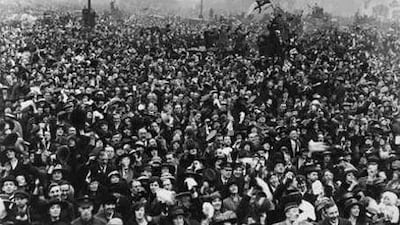For those who haven't tuned into British television recently - preferring the company of The A-Team and Knight Rider box sets - the dwarfs who toil at the creative coal faces at Auntie, ITV and Channel 4 have been clocking overtime. Ladette to Lady, Extreme Celebrity Detox, ASBO Teen to Beauty Queen and Arrange Me a Marriage: just some highlights designed to make millions want to tear up their licence fees and return their TV sets to retailers.
The television landscape in the United States couldn't be more different. Network and cable shows such as The West Wing, The Sopranos, The Wire and Mad Men have resurrected an interest in drama, with a new language that focuses laser-like on character plotting and adventurous storytelling. British television has, in previous decades, unleashed intellectually rigorous series such as The World at War, The Nazis: a Warning from History and the BBC's Reputations strand. In recent years, however, broadcasters have abandoned the higher ground for the sewer of reality TV. The title of one recent series, Booze Bash Birds, indicates the malaise has mutated into The Daily Mail on an off-news day.
All of which makes Andrew Marr's The Making of Modern Britain, a six-part series originally broadcast on BBC2 in 2007, somewhat of an aberration on the airwaves. The host, who was previously the editor of The Independent and currently presents The Andrew Marr Show on BBC1, navigates an ideologically neutral route through the first half of the past century. The vogue in many modern documentaries is to personalise modern history - allowing hosts of shows such as Who Do You Think You Are? to reflect on their narratives. The Making of Modern Britain, on the other hand, is an even-handed account beginning with the passing of Queen Victoria. As news of her death spreads to the colonies, the empire, says Marr, begins to falter. In death, she ignited the tinderbox of radical societal change in Britain.
Little needs to be said about the injustices that plagued the UK at the beginning of the 20th century: poverty, despair and illiteracy were the norm for many of the King's subjects. Only one-quarter of the British population, all men, had the right to the ballot. In the words of the then prime minister, Lord Salisbury, voters were to be regarded as "vermin". From the armchair of the empire, Britain ruled over 25 per cent of the world's population. The next 20 years alone were to see women campaign and win the right to vote; the politicisation of the labour union movement; India demand independence; Victorian reforms that took education to the masses; and, with tragic consequences, the UK's entry into the First World War.
Marr narrates the passing of the first half of the century with studied calm, detailing the hypocrisy at the heart of Edwardian Britain that, in no small manner, was a reaction against Victorian norms. And with his relaxed affability, boyish enthusiasm and narrative flair, Marr is a compelling host - watch him bound around the Irish site of Michael Collins' killing in 1922 or stride past the first generation of middle-class houses in the UK. He is equally ebullient when describing the delirious joy that gripped the UK in the aftermath of the First World War. He also displays a neat line in political impersonations - this writer is too young to have met Winston Churchill, but Marr's throaty evocation of the wartime prime minister, breathing fire at German advances, is one highlight. Equally impressive is the fear he generates when describing the bombs that paralysed London in 1915, when Germany's wartime Zeppelins began their reign of terror.
The series ends with D-Day, a sense of victory and severe loss. According to some figures, Britain lost nearly 500,000 men, women and children during the course of the war. Marr marks D-Day as the beginning of yet another radical shift - presumably a softening in attitudes that yielded the UK of the 1960s as well as the mass unemployment in the Seventies and Thatcherism in the 1990s. In the end, all these developments are left hanging in the balance: leaving this viewer to think that this series demands a sequel.
@Email:bwazir@thenational.ae

